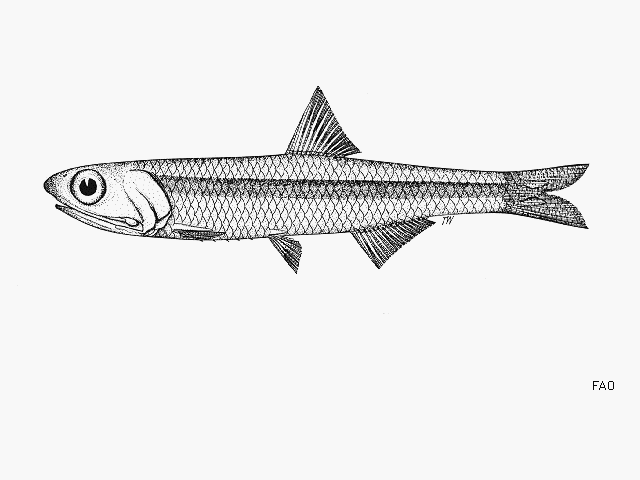| Engraulidae (Anchovies), subfamily: Engraulinae |
| 6.17 cm SL (male/unsexed) |
|
pelagic-neritic; marine |
| Western Central Pacific: Taiwan, Philippines, Indonesia and Tonga. |
|
Dorsal spines (total): 0-0; Anal spines: 0-0; Anal soft rays: 15-15. This species is distinguished by the following set of characters: unbranched dorsal and anal fin rays 3; branched pectoral-fn rays 11-14 (modally 12); pseudobranchial flaments 16-22 (16); first gill arch with upper limb gill rakers 12-14 (13), lower limb 16-18 (17), total 28-32 (30); second gill arch with upper limb gill rakers 10-11 (10), lower limb 12-17 (16), total 22-27 (27); third gill arch with upper limb gill rakers 8-9 (9), lower limb 10-11 (10), total 18-20 (18); fourth gill arch with upper limb gill rakers 6-8 (7), lower limb 8-9 (8), total 14-16 (19); gill rakers 3-5 (4) on hind face of third gill arch; spine-like scutes on abdomen 3-6 (4); transverse scales 8-9 (9); exposed urohyal bony, without fleshy knobs; head is large, its length 28.3-29.8% (mean 28.9%) of SL; maxilla rather is long, its length 19.0-20.7% (19.9%) of SL, its posterior tip just reaching to anterior margin of preopercle; lower jaw is rather long, its length 19.1-20.5% (19.7%) of SL; orbit is long, its diameter 8.3-8.8% (8.6%) of SL; snout is long, its length 4.9-5.2% (5.1%) of SL; body is elongate, its depth 13.3-15.3% (14.5%) of SL; pelvic fin is short, its length 8.7-9.4% (9.0%) of SL (Ref. 124514). |
| Presumably schooling, although the three type (and only known) specimens were caught after 20 months of sampling. Evidently rare. |
|
Data deficient (DD); Date assessed: 28 February 2017 Ref. (130435)
|
| harmless |
Source and more info: www.fishbase.org. For personal, classroom, and other internal use only. Not for publication.
